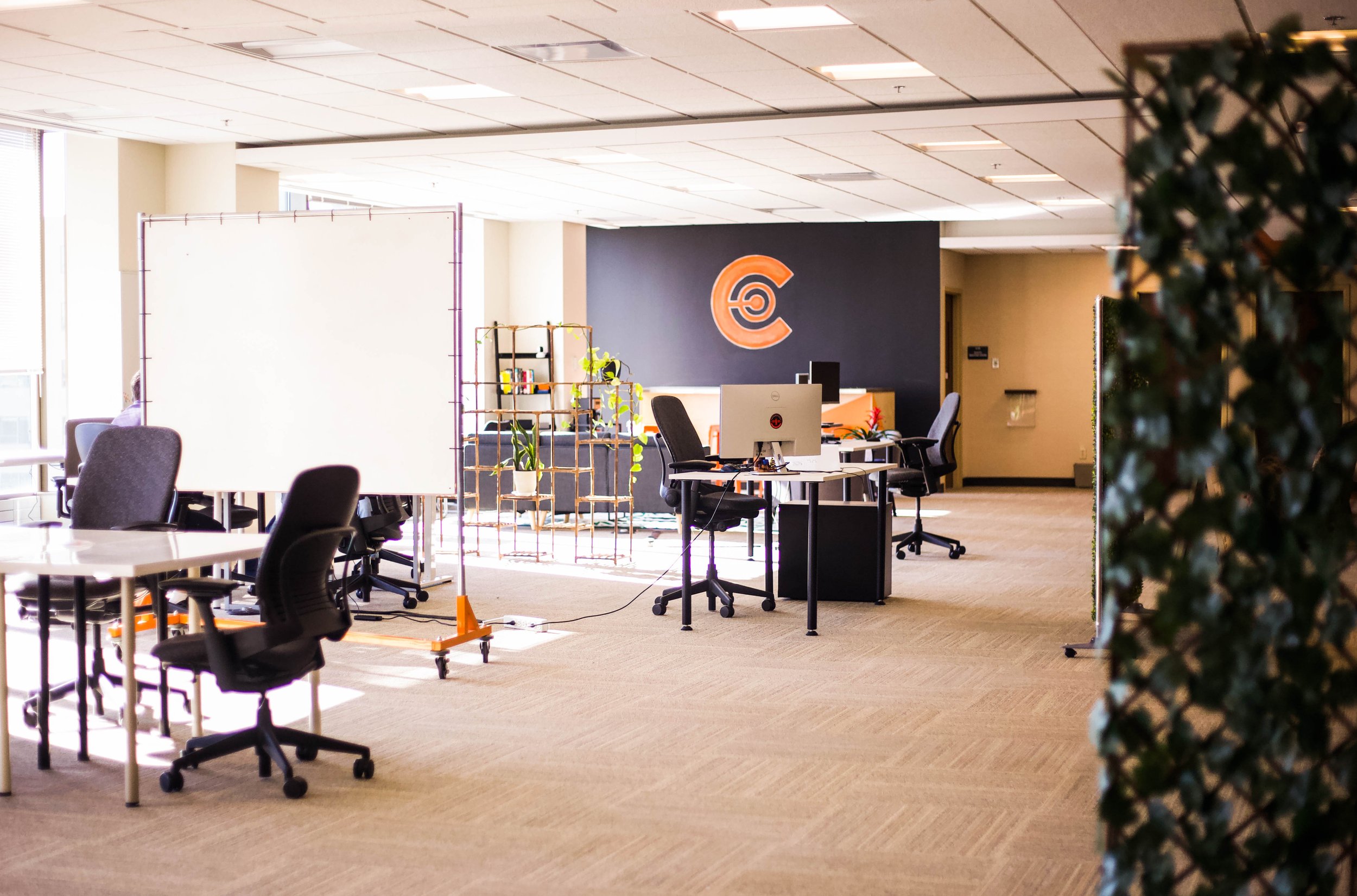
Amplifying stories from the Rochester, MN entrepreneurial ecosystem.
Collider Foundation is Awarded Funds by the Carl & Verna Schmidt Foundation for Coworking Improvements
Rochester 501(c)3 nonprofit Collider Foundation was recently awarded $6,000 by the Carl and Verna Schmidt Foundation. These funds were utilized in the maintenance and improvement of the amenities provided by Collider Foundation to its coworking members, supporting our mission to create a warm and welcoming space where innovative individuals can gather, work, and spark new ideas.
Since its inception as a coworking space in 2016, Collider has been dedicated to fostering connections within its walls though its member community, networking, and educational events. Now, as a non-profit organization, our mission has grown to support the growth and education of early stage entrepreneurs. Collider aims to identify and assist local innovators in overcoming barriers to success by empowering an impactful, inclusive, and entrepreneur-first ecosystem. We believe that providing a low-cost, accessible space for entrepreneurs, remote workers, and visitors is vital to creating that ecosystem. This funding from the Carl and Verna Schmidt Foundation has greatly contributed to improving and building upon a welcoming, productive workspace for our community of coworkers and entrepreneurs.
The Carl and Verna Schmidt Foundation was established in Minnesota in 1958 and has since focused its giving on public libraries, health associations, volunteer fire departments and human services. They have additionally provided funding for the arts, natural resource conservation, animals and wildlife.
"Collider has always fostered a collaborative and welcoming community," said Collider's Community Manager Sam Gill. "These upgrades, made possible thanks to the generosity of the Carla and Verna Schmidt Foundation, will allow us to serve even more coworkers in a space that promotes creativity, encourages productivity, and develops meaningful connections."
If you have any questions about Collider or our work within the community, please contact Amanda Leightner at amanda@collider.mn or call (507) 722-0306.
SWOT Analysis: A Guide to Informed Decision-Making
In the ever-evolving landscape of business, decisions aren't just made; they're strategically crafted. Whether you're an entrepreneur getting your startup off the ground, a seasoned executive navigating market shifts, or a small business owner seeking growth opportunities, the importance of informed decision-making cannot be overstated. At the heart of this strategic prowess lies a simple yet effective tool: the SWOT analysis.
SWOT (Strengths, Weaknesses, Opportunities, Threats) analysis isn't just a fancy acronym; it's a game-changer, offering a structured approach to understanding the factors influencing your business decisions. Whether you're a novice entrepreneur or a seasoned business leader, SWOT analysis can transform the way you approach decision-making.
When conducting a SWOT analysis to evaluate internal factors like financial resources, physical resources, human resources, access to natural resources, trademarks, patents, copyrights, and current processes, begin by assessing each factor's strengths and weaknesses. For financial resources, consider factors such as the stability of funding sources, the diversity of income streams, and potential investment opportunities. Evaluate physical resources by analyzing the adequacy of location, the condition of facilities and equipment, and their alignment with business goals. Assess human resources by examining the skills and expertise of employees and volunteers, as well as their alignment with the needs of target audiences. Delve into the accessibility and uniqueness of natural resources and intellectual property, identifying both advantages and limitations. Finally, scrutinize current processes, including employee programs, department hierarchies, and software systems, identifying areas of efficiency and areas for improvement. By analyzing these internal factors, businesses can gain a comprehensive understanding of their strengths and weaknesses, laying a solid foundation for informed decision-making and strategic planning.
Next, use SWOT analysis to evaluate external factors influencing your business decisions. Begin by scrutinizing market trends, including new products, technological advancements, and shifts in audience needs, identifying opportunities for growth and potential threats to market relevance. Evaluate economic trends on local, national, and international scales, recognizing opportunities for expansion and vulnerabilities. Assess funding sources such as donations and legislative support, recognizing their strengths in providing financial stability and potential weaknesses in dependence on external factors. Demographics play a pivotal role, offering insights into target audience preferences and market segments, while relationships with suppliers and partners provide strengths in collaboration and weaknesses in dependency. Finally, consider the impact of political, environmental, and economic regulations, recognizing both opportunities for compliance and threats to operational freedom. By looking at these external factors, businesses can develop a stronger understanding of their market position, enabling informed decision-making and strategy development.
Conducting a SWOT analysis offers businesses a holistic view of internal strengths and weaknesses alongside external opportunities and threats, empowering informed decision-making by illuminating potential pathways to success while mitigating risks. By leveraging this strategic tool, businesses can navigate the complexities of the market landscape with clarity and confidence, ultimately paving the way for sustainable growth and resilience in an ever-changing business environment.
Q&A with Jessica Olson of Life with Extra Heart
Take a moment to meet Jessica Olson, prior CO.STARTERS graduate and current participant of our first incubator program!
Q: Share a bit about your business and who your target customers are!
A: Life with Extra Heart is inspired by the unique way parents of children with special needs navigate the world, wearing their hearts on their sleeves and fostering deep connections.
Multiple studies have shown that parents of children with special needs experience greatly Increased stress levels, and Life with Extra Heart Is here to support them In meaningful ways.
Future offerings:
Holistic retreats, Including activities such as yoga, mindfulness, acupuncture, nature, education
Postpartum support for parents with a new diagnosis
Opportunities for parents/caregivers to pursue their own passions
Monthly parent group
Respite care
Our first mini-retreat is planned for May 11th!
Register here: https://lifewithextraheart.myflodesk.com/cwrkpxict7
Visit @lifewithextraheart on instagram or email jessica@lifewithextraheart.com
Q: What do you hope to get out of the incubator program?
A: I hope to continue to dedicate time to launching other pieces of Life with Extra Heart, and to continue to learn from entrepreneurs before me.
Q: What is your motivation and inspiration for pursuing your business idea?
A: I’ve always been drawn to helping parents, and when my youngest was born with Down syndrome, I knew this would be part of how I wanted to help. With an educational background in mental wellness and as a yoga instructor, I am passionate using my knowledge to help others care for themselves and connect with each other in authentic and sustainable ways.
I want to provide holistic wellness support to parents and caregivers of people with special needs and complex medical needs. We help parents discover and address “root cause” areas instead of bandaid solutions, and have resources to take care of themselves in healthy ways.
Q: Share a little bit about yourself, your background, and your hobbies and interests!
A: I live in Rochester with my husband, Ryan, and our three sons and dog. I’ve worked in a variety of fields, most recently as a school counselor and yoga teacher. I’m currently home with my two youngest boys.
I am currently on a path of more intentional and meaningful living and enjoy music, being outdoors, and connecting with others.
Q: How has being involved in Collider programming and CO.STARTERS been of assistance to you so far in your business journey?
A: CO.STARTERS opened my eyes to what was actually needed to start a successful business. It gave me support and accountability, and I’ve also met some amazing people! I am looking forward to continuing to grow with the incubator program and am grateful for the opportunity.
Q&A with David Razidlo of Game Haven
Take a moment to meet David Razidlo, a graduate of our very first CO.STARTERS cohort in 2022, volunteer and co-facilitator for following CO.STARTERS cohorts, and current participant of our first incubator program!
Q: Share a bit about your business and who your target customers are!
A: Game Haven is a web app dedicated to board gaming - helping people find new games they will like, people to play with, and board gaming events near them. More than that, our goal is to help people connect with their communities and create meaningful interactions. Our target customers are any people who find fun in playing games - from very casual, social gamers all the way to very serious board gaming groups - as well as businesses who host gaming events or sell games.
Q: What do you hope to learn from and get out of the incubator program?
A: At each stage in the development of Game Haven, there have been new challenges and risks. Now that our web app is ready for adoption, we need support in how to launch, gain traction, market our product, and scale our reach. I am excited for the Incubator program for mentorship and guidance on this new phase of our startup, to help make connections with experts, and to build my professional network in Rochester.
Q: How has being involved in Collider programming and CO.STARTERS been of assistance to you so far in your business journey?
A: Collider programs including CO.STARTERS have been crucial for our business development. As a solo-preneur, it has been incredibly powerful to build a network of business professionals and connect with the entrepreneurial ecosystem in Rochester. These programs have provided structured mentorship and access to experts in all aspects of building a startup, and have kept us on track with the essentials in starting a business. The feedback from other entrepreneurs has been so supportive and has been critical in helping my dream become a reality.
Q: What is your motivation for pursuing your business idea?
A: Board games provide a way for people to connect in person - either with people they know or with complete strangers. Anyone can play games together, regardless of their backgrounds or even their languages. But it can be challenging to find people who like to play the same types of games, or find the places and dedicated times to play. The more I talk to people, the more I find that other people feel the same way. I wanted to help people make those connections and increase positive in-person interactions, and happiness* in the community.
*As part of our Terms of Service, Game Haven claims 1% of all happiness generated by board games!
Q&A with Dinalynn Rosenbush of The Language of Play
Take a moment to meet Dinalynn Rosenbush, a graduate of our winter CO.STARTERS cohort and current participant of our first incubator program!
Q: Tell us a bit about your business!
A: I am growing a coaching/consulting practice for parents. The focus is for parents to know how to help their children that have speech/language delays, build communication and listening skills. I already have a good following through my podcast called The Language of Play.
Q: What do you hope to learn from CO.STARTERS and the Incubator Program?
A: I have quite a few holes in my foundation in this business. I don’t know /understand legal stuff, how to market, and have a plan for finding my clients. I am hoping these programs help me connect the dots!
Q: What is the motivation behind pursuing your business idea?
A: My motivation is very multifaceted! As a SLP (Speech-Language Pathologist) , I know that nation-wide there are more needs than SLPs available to meet the needs. This is an attempt to fill the gap using our greatest resource: Parents! I want to equip parents to help their children so that they can team with the SLP, and leave the only the hardest issues for the SLP by showing parents how to teach specific skills to their child, building confident, successful parents along the way! Also, after a debilitating illness, I decided that I want to change career and still use my skills. This is my chosen path. I want to build a vision that has existed in me for many years. I want to have an income that I determine, and I want to learn to leverage and multiply.









